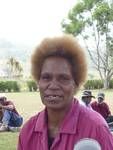Matthew Flenders Borari - Oral History interview recorded on 24 May 2014 at Beama, Northern Province, PNG
- Description:
- Mr Matthew Flenders Borari tells the story of his uncle Gomba who was a member of the Papuan Infantry Battalion. He also speaks of his father and mother and how his mother had to protect him by constantly moving to get away from the bombing during the War. PNG Voices from the War is supported through the Papua New Guinea-Australia Decentralisation and Citizen Participation Partnership. The content is owned by the PNG National Museum and Art Gallery, and hosted by Deakin University. Visit the Voices from the War website - http://pngvoic...
- Display date:
- 2014
- Location:
- Papua New Guinea
- Format:
- Sound/Interview, lecture, talk
- Collections:
- Papua New Guinea National Museum and Art Gallery
- Contributors:
- Orore, Barnabas
- Publisher:
- Deakin University
- Content partner:
- Papua New Guinea National Museum and Art Gallery
- Availability:
- Online
-
Copyright status: Share, modifyFind out more about what you are able to do with this itemMore informationPapua New Guinea National Museum and Art Gallery has this to say about the rights status of this item:
Deakin University https://creativecommons.org/licenses/by-nc-sa/4.0/
What can I do with this item?Non-infringing useNZ copyright law does not prevent every use of a copyright work, and this item may be hosted by an international institute or organisation. You should consider what you can and cannot do with a copyright work.Share itThis item is suitable for copying and sharing with others, without further permission.Modify itThis item is suitable for modifying, remixing and building upon, without further permission.Check about commercial useYou'll need to confirm with the copyright holder using this item for commercial purposes.
Related items
Welcome and warm Pasifik greetings
The information on this site has been gathered from our content partners.
The names, terms, and labels that we present on the site may contain images or voices of deceased persons and may also reflect the bias, norms, and perspective of the period of time in which they were created. We accept that these may not be appropriate today.
If you have any concerns or questions about an item, please contact us.


